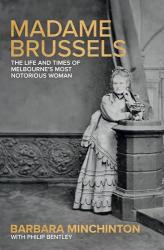
A must-read biography of an enigmatic personality who helped shape early Melbourne
Madame Brussels, the most legendary brothel keeper in nineteenth-century Melbourne, is still remembered and celebrated today. But until now, little has been known about Caroline Hodgson, the woman behind the alter ego.
Born in Prussia to a working-class family, Caroline arrived in Melbourne in 1871. Left alone when her police-officer husband was sent to work in remote Victoria, she turned her hand to running brothels. Before long, she had proved herself brilliantly her principal establishment was a stone's throw from Parliament House, lavishly furnished and catered to Melbourne's ruling classes.
Caroline rode Melbourne's boom in the 1880s, weathered the storm of the depression years in the 1890s and suffered in the moral panic of the 1900s. Her death in 1908 signified the end of one kind of Melbourne and the beginning of in terms of prostitution, the city went from tolerance to complete prohibition in her lifetime.
Drawing on extensive research, author and historian Barbara Minchinton deftly pieces together Madame Brussels' story and guides readers on a journey through a fascinating, colourful period in Melbourne's history. This is a major biography of an Australian icon.
Madame Brussels, Barbara Minchinton
This is the biography of Caroline Hodgson, the woman who became known as Madame Brussels. She was a legendary brothel keeper in nineteenth century Melbourne, with a laneway in the city now named after her, and yet even during her life, she was an enigmatic and private woman who kept a very low profile, given the high-profile opposition against her.
Born in Prussia into a struggling working-class family, she made her way to Melbourne in 1871, alongside her husband, a member of a well-to-family with a story of his own. When he abandoned her to work as a policeman in remote Victoria, she turned her hand from running a boarding house to the considerably more lucrative option of brothels. Her principle establishment, a stone's throw from Parliament House, was lavishly furnished, carefully private, set up specifically to cater to Melbourne's ruling class.
Which needless to say, come the "moral panic" of the 1900s, that self-same class, egged on by some firebrand religious zealots, and self-appointed moral crusaders, turned on her, and her booming, and well-run business, flagged. Yet she persisted and quietly resisted. She managed to keep going, to remain independent, eventually caring for her dying husband, ensuring her adopted daughter got the best possible chance in life, recovering yet again after a disastrous second marriage until her own death in 1908.
Much of Hodgson's life is unknown and Minchinton has done a sterling job in outlining what brief few details there are available, although a hefty part of the book does concentrate on the background to prostitution, and the pathway that Melbourne took from tolerance to prohibition. Which is very well documented because most of the anti-prostitution men were loud, persistent and utterly focused on the women, never on the male clients.
So many things never change.
Anyway, it's hard to avoid the realisation that so much of women's stories are under told, under researched, under documented, under appreciated. Caroline Hodgson was a gutsy, determined, independent woman who survived everything the world tried to throw at her and her icon status is well deserved.